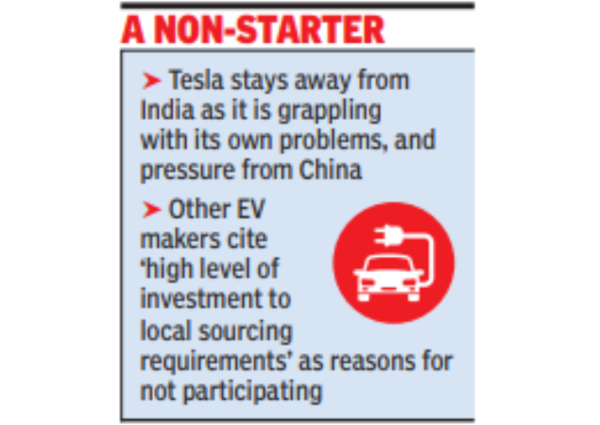NEW DELHI: Six months after launching the EV policy, allowing lower duty imports for companies that commit to make in India, the government has decided against aggressively courting the likes of Tesla, VinFast, Mercedes and BMW due to lukewarm response to the regime. Besides, lobbying by Indian players that have invested in creating a strong product pipeline, as well as by Japanese carmakers, which have been slow off the blocks in getting zero-emissions vehicles and are pitching hard to get hybrids the same status as electrics, has played its part.
The stiff resistance from local incumbents and their aggressive positioning across ministries dealing with automobiles-related issues – from heavy industries to road transport and commerce and industry – is also expected to result in a dilution of benefits for electric vehicles that were proposed under the free trade agreement with the UK, sources privy to the discussions told TOI.

The EV policy, seen to have been tailored to Tesla’s requirements, has seen the Elon Musk-run company stay away from India as it is grappling with its own problems, and pressure from China. Others have cited multiple lacunae – from high level of investment to local sourcing requirements and “onerous investment commitments” – to argue that the policy was not a privilege being extended to them.
Several overseas companies, which are already in India, want their past investments to be recognised, saying they cannot make a new factory just to be eligible for benefits under the EV policy. “So far, we have not heard much from the companies on the EV policy and investments. The chances look grim, though we are still hopeful and are maintaining dialogue with companies wherever required,” a government official said.
The lobbying against EVs is led by Maruti Suzuki and Toyota, which together control more than half the car market and account for bulk of the hybrid sales, where they are allies. The Japanese companies are believed to be working behind the scenes, both at the Centre and at the state level, to ensure that hybrids get the same policy regime as electrics. Besides, Tata Motors and Mahindra have argued that by allowing lower duty imports, even at the so-called upper end of the market would adversely hit their plans and investments, a top government source told TOI.


